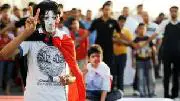WASHINGTON/Manama — The use of torture and the systematic mistreatment of detainees by the authorities have been confirmed by an independent commission set up by the government of Bahrain to look into the violence surrounding the rise and suppression of the Arab Spring movement in the Gulf state earlier this year.
Mahmoud Cherif Bassiouni, the Egyptian-American lawyer who headed the team that carried out the investigation and wrote the 500-page report, said there was no evidence that Iran played any role in the pro-democracy protests by the island kingdom’s 70 percent Shi’a majority. Iranian involvement has been repeatedly alleged by the Bahraini government and its allies to justify the brutality of its actions.
In the hours before the report’s publication yesterday, pro-democracy demonstrators again took to the streets in Manama, the Bahraini capital, and were met with riot police who fired teargas to disperse the protesters.
The study describes how evidence from victims of torture, and forensic examination of their injuries, showed that torture was systematically employed, using a wide range of techniques including electric shocks, whipping on the soles of the feet with cable, beating with rubber hoses, exposure to extreme temperatures and sleep deprivation. Mr. Bassiouni confirmed that five detainees had died under torture.
Bassiouni said 35 people were killed, including five security personnel, adding that numerous detainees were tortured and coerced into giving confessions.
Bassiouni’s death toll differed from a similar report released by a coalition of Bahraini human rights groups on Tuesday, which claimed 45 people were killed during the crackdown.
The report was presented with great ceremony in Bahrain in front of Bahrain’s king, Hamad bin Isa al-Khalifa, who admitted to “serious shortcomings on the part of some organs of our government, particularly in failing to prevent instances of excessive force and of the mistreatment of persons placed under arrest.” One of the purposes of the king commissioning the report appears to be to distance himself and the royal family from the brutal repression of the pro-democracy protesters in March.
But the report does make clear that the identical tactics used by the Bahrain security forces in arresting detainees – such as wearing black masks, destroying property, shouting abuse – is strong evidence that they had all received similar training. The report says “this could not have happened without the knowledge of higher echelons of the command structure” of the security forces.
The Bahrain Independent Commission of Inquiry (BICI) received 559 complaints of torture, all but nine of them from Shi’a. Some of the most notorious cases involved medical staff from the Salmaniya Medical Complex who alleged that they were tortured and forces to sign confessions – often admitting to being part of a revolutionary conspiracy orchestrated by Iran — which they could not see because they were blindfolded for days on end.
The Bahrain government is seeking to portray the torture and mistreatment as never having been official policy and that it has in any case ceased since June 10th. While regretting the use of torture and the mistreatment of detainees as well as death by torture of five people, the government spokesman said: “those responsible are among 20 officers already being prosecuted.”
A further problem facing King Hamad is that the reigning dynasty, the al-Khalifa family, is divided about the degree of repression to be used. In addition, the Shi’a protests during the early part of the year have left a legacy of deep sectarian suspicion and hatred between Sunni and Shi’a which is unlikely to dissipate for several years. At the height of repression, the authorities bulldozed Shi’a mosques and holy places alleging that they did not have the correct building or planning permits.
Bahrain report released, opposition skeptical
Hours before the release of the much-anticipated report, clashes had erupted in Alia between protesters and security forces after a man was struck and killed by a police car.
Police fired tear gas and beat protesters with batons.
Further protests are expected in coming days, as tensions rise between pro-democracy activists and police.
Opposition leaders have called for protests to coincide with the report’s release and said that the inquiry will not be of relevance unless it faults senior officials.
Freelance journalist Matthew Cassel, told al-Akhbar from Bahrain that many remained skeptical of the commission’s impartiality, given it was established and funded by the kingdom’s rulers.
“Local people were telling me how can a commission be independent when it’s financed and established by the King, the one who’s committing the crimes, ” Cassel reported.
Bahrain witnessed mass pro-democracy protests against the royal family of King Hamad Al-Khalifa in February 2011.
Also dubbed the Pearl Revolution, protests were crushed when Saudi Arabia and other Gulf neighbors sent troops into Bahrain, reinforcing a crackdown that has led to accusations of serious human rights violations.
Home to the US Navy’s Fifth Fleet and on Iran’s doorstep, Bahrain is a crucial U.S. ally in a region currently rocked by a wave of pro-democracy protests, otherwise known as the Arab Spring.
A U.S. $53 million U.S. arms deal with Bahrain is on hold amid concern over Manama’s possible human rights violations. Washington has linked the approval of the arms deal to the Bassiouni Commission.
Bahrain is ruled by a Sunni royal family over a majority Shi’a population. Pro-democracy protests, however, drew both Sunni and Shi’a activists in an attempt to end absolute monarchical rule of the state.






Leave a Reply